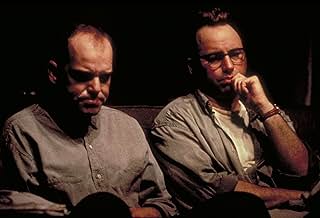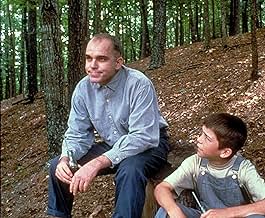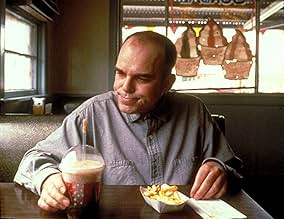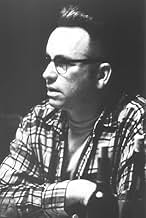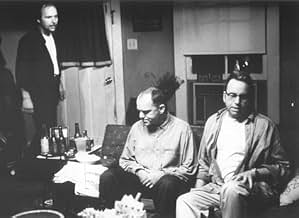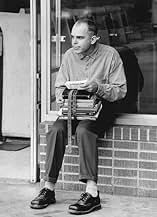Sling Blade
- 1996
- Tous publics
- 2h 15m
Karl Childers, a simple man hospitalized since his childhood murder of his mother and her lover, is released to start a new life in a small town.Karl Childers, a simple man hospitalized since his childhood murder of his mother and her lover, is released to start a new life in a small town.Karl Childers, a simple man hospitalized since his childhood murder of his mother and her lover, is released to start a new life in a small town.
- Won 1 Oscar
- 14 wins & 15 nominations total
Christine Renee Ward
- Melinda
- (as Christy Ward)
Bruce Hampton
- Morris
- (as Col. Bruce Hampton Ret.)
Featured reviews
This film is a perfect example of how a film should be made. It has everything, good cast, good script, good performances everything is perfect. This has to be one of my all time favourite films and Billy Bob Thornton is a good a writer and director as he is an actor. The Oscar for best adapted screenplay was well deserved and it shocks me that Billy Bob didn't win the oscar for best actor. I bought this film on DVD and it is a shame you do not get any features but I hope they will release a special edition with contribution from the writer, actor and director himself. I urge everyone to watch this film because it is funny, emotional, enjoyable and just plain brilliant. 10/10
10Buddy-51
Set in a small, rural Southern town, Billy Bob Thornton's "Sling Blade" is so flavorful in ambiance and tone, so rich in character and theme that it's hard to believe that its roots are not to be found in any short story or novel. For while it has all the earmarks of a great work of literature, "Sling Blade" is actually an original creation by Thornton, the triple threat talent who wrote, directed and stars in the work.
Karl Childers is a marginally retarded man who's been living in a mental institution ever since, as a child, he accidentally stumbled across his mother and her lover in a compromising position and, in a moment of considerable confusion, hacked the two of them to death. After being officially declared by the state to be "rehabilitated" and "cured," Karl is thrust back out into the world where he forms a bond with a fatherless boy, his hardworking, compassionate mother and a gay storeowner who has long since become a part of their extended family. Also part of that family is the widow's twisted boyfriend, Doyle Hargraves, who physically and psychologically abuses both mother and son.
Thanks to Carl's "strangeness" and homicidal background, as well as the simmering volatility and mercurial temperament of Doyle, there is always the threat of violence hanging ominously over the work. Yet, in many ways, "Sling Blade" is really about the goodness of people in their willingness to overlook external differences and to find the similarities that unite us all in a common bond of humanity. For the most part, the people in this quiet little community try to reach out and befriend Karl, sensing a decency in him that helps to mitigate any possible fear they might have of him based solely on surface eccentricities. Even when he is eventually forced into violent action, he does so as an avenging angel bringing swift and righteous justice, not as a murderous demon acting out of hatred or malice.
The acting in the film - beginning with Thornton himself - could not be more brilliant. With his stooped shoulders, tight-lipped smile, jutting jaw, vacant expression and guttural throat-clearing, Karl became the butt of so many jokes back when the movie first came out that it's easy to forget what a truly amazing character - and job of acting - Thornton has pulled off here. The actor we've known from so many other movies is completely invisible in this role, as he literally becomes Karl in every fiber of his being and, in so doing, forces us to see the wisdom and humanity buried deep inside the person. The performance is such a touchstone of acting for our generation that it is easy to miss all the other great acting in the film, particularly on the part of Natalie Canerday, Lucas Black, John Ritter, J.T. Walsh, Robert Duvall and, most especially, Dwight Yoakam, whose portrayal of a man teetering on the edge of a psychopathic meltdown is bone-chilling and brilliant.
As a writer, Thornton has shaped his film like a modern day parable - simple, symbol-laden and allegorical. As a director, he proves himself a master of rhythm and pacing, setting the mood and allowing the scenes to play themselves out without recourse to overstatement or melodrama. In fact, this is one of those rare movies in which every moment feels just right, so confident is Thornton in his ability as a filmmaker to bring his story to life on screen. He also knows how to make the bucolic setting come across as both stark and sensuous at the same time, a place of quiet stillness that provides the perfect backdrop for the morality tale he is endeavoring to tell. Finally, Daniel Lanois has provided a haunting musical score that ever so subtly draws us into the disturbingly offbeat world of the drama.
"Sling Blade" earned a Best Original Screenplay Oscar for Thornton, but he should also have won awards for his directing and his performance as Karl, not to mention the film itself which should have won the honor as Best Picture of 1996 - although Hollywood, in its infinite wisdom, failed even to nominate it. Ah well, even with that lapse in judgment, "Sling Blade" remains one of the great movie dramas of the past decade.
Karl Childers is a marginally retarded man who's been living in a mental institution ever since, as a child, he accidentally stumbled across his mother and her lover in a compromising position and, in a moment of considerable confusion, hacked the two of them to death. After being officially declared by the state to be "rehabilitated" and "cured," Karl is thrust back out into the world where he forms a bond with a fatherless boy, his hardworking, compassionate mother and a gay storeowner who has long since become a part of their extended family. Also part of that family is the widow's twisted boyfriend, Doyle Hargraves, who physically and psychologically abuses both mother and son.
Thanks to Carl's "strangeness" and homicidal background, as well as the simmering volatility and mercurial temperament of Doyle, there is always the threat of violence hanging ominously over the work. Yet, in many ways, "Sling Blade" is really about the goodness of people in their willingness to overlook external differences and to find the similarities that unite us all in a common bond of humanity. For the most part, the people in this quiet little community try to reach out and befriend Karl, sensing a decency in him that helps to mitigate any possible fear they might have of him based solely on surface eccentricities. Even when he is eventually forced into violent action, he does so as an avenging angel bringing swift and righteous justice, not as a murderous demon acting out of hatred or malice.
The acting in the film - beginning with Thornton himself - could not be more brilliant. With his stooped shoulders, tight-lipped smile, jutting jaw, vacant expression and guttural throat-clearing, Karl became the butt of so many jokes back when the movie first came out that it's easy to forget what a truly amazing character - and job of acting - Thornton has pulled off here. The actor we've known from so many other movies is completely invisible in this role, as he literally becomes Karl in every fiber of his being and, in so doing, forces us to see the wisdom and humanity buried deep inside the person. The performance is such a touchstone of acting for our generation that it is easy to miss all the other great acting in the film, particularly on the part of Natalie Canerday, Lucas Black, John Ritter, J.T. Walsh, Robert Duvall and, most especially, Dwight Yoakam, whose portrayal of a man teetering on the edge of a psychopathic meltdown is bone-chilling and brilliant.
As a writer, Thornton has shaped his film like a modern day parable - simple, symbol-laden and allegorical. As a director, he proves himself a master of rhythm and pacing, setting the mood and allowing the scenes to play themselves out without recourse to overstatement or melodrama. In fact, this is one of those rare movies in which every moment feels just right, so confident is Thornton in his ability as a filmmaker to bring his story to life on screen. He also knows how to make the bucolic setting come across as both stark and sensuous at the same time, a place of quiet stillness that provides the perfect backdrop for the morality tale he is endeavoring to tell. Finally, Daniel Lanois has provided a haunting musical score that ever so subtly draws us into the disturbingly offbeat world of the drama.
"Sling Blade" earned a Best Original Screenplay Oscar for Thornton, but he should also have won awards for his directing and his performance as Karl, not to mention the film itself which should have won the honor as Best Picture of 1996 - although Hollywood, in its infinite wisdom, failed even to nominate it. Ah well, even with that lapse in judgment, "Sling Blade" remains one of the great movie dramas of the past decade.
As someone who loves good filmmaking, I rate this film among the best I've ever seen in all areas of the craft. Some of the criticisms of this film are hard to fathom.
The screenplay has the tight conciseness of a well-honed play (which this essentially was derived from) and doesn't fail to prick at the emotions and the intellect of the viewer. The photography, the casting and the editing all click together quite admirably.
However, I always marvel at the negative, emotionalized responses to otherwise superb films such as this by those who seem to miss the entire point of a movie like "Sling Blade".
I did not see a political message about abortion, or a justification of murder or even a backhanded putdown of the rural people of Arkansas. (Many of the characters were locals, by the way.) Some viewers are setting themselves up to be against this film since they are wearing their own feelings on their sleeves and fail to see the subtle layers of the story. They are seeing only the reflection of themselves on the surface of the water, rather than the complex world below.
Theater and film are rooted in images and characterizations designed to help us explore the human condition. It was once said that Tolstoy's voluminous novel "War and Peace" could be summed up in a single sentence thereby negating the need to write the book. Art is not a fast explanation, but a captivating and thought-provoking trip that hopefully forces us to think about our own motivations. Taking a one-dimensional view of this film might lead one to believe that Karl Childer's central message is that we should all eat biscuits smeared with mustard.
"Sling Blade" excels at the job of making us examine the terrible choices life gives us by providing a set of characters who interact in a moving, curious and revealing way. It is not reality nor is it political, but a method by which we can look at our own individual realities.
Others who seemed disenchanted with this film out-of-hand are those who found it "slow". Helloooo! This film is SUPPOSED to be slow and agonizingly so. It is carefully walking you to the conclusion, step-by-step, so you can squirm uncomfortably at the overall foreshadowing. It ain't an explosion-a-minute John Woo filmmaking and it certainly isn't light comedy, though it induces a surprising number of smiles.
This is a film that makes us look at true evil in the form of J.T. Walsh, Dwight Yoakum and Robert Duval's characters and compare it to the pure goodness of the damaged creature portrayed by Billy Bob Thornton, whose own brutalization leads him to seek justice in his own imperfect way.
To help those out who didn't "get" this film, I might recommend that you consider Thornton's character to be an amalgamation of Herman Melville's innocently homicidal protagonist in "Billy Budd" and Mary Shelley's sad monster Frankenstein. These characters, like Thornton's Karl Childers, were dramatic vehicles for the purpose of making us think. They did bad things but we were forced to view them compassionately because they reflected our own conflicting traits.
Don't read things into a film that aren't there, but don't ignore the interesting elements that are. Get those wheels upstairs turning and start enjoying intelligent filmmaking instead of merely seeking an excitement fix!
The screenplay has the tight conciseness of a well-honed play (which this essentially was derived from) and doesn't fail to prick at the emotions and the intellect of the viewer. The photography, the casting and the editing all click together quite admirably.
However, I always marvel at the negative, emotionalized responses to otherwise superb films such as this by those who seem to miss the entire point of a movie like "Sling Blade".
I did not see a political message about abortion, or a justification of murder or even a backhanded putdown of the rural people of Arkansas. (Many of the characters were locals, by the way.) Some viewers are setting themselves up to be against this film since they are wearing their own feelings on their sleeves and fail to see the subtle layers of the story. They are seeing only the reflection of themselves on the surface of the water, rather than the complex world below.
Theater and film are rooted in images and characterizations designed to help us explore the human condition. It was once said that Tolstoy's voluminous novel "War and Peace" could be summed up in a single sentence thereby negating the need to write the book. Art is not a fast explanation, but a captivating and thought-provoking trip that hopefully forces us to think about our own motivations. Taking a one-dimensional view of this film might lead one to believe that Karl Childer's central message is that we should all eat biscuits smeared with mustard.
"Sling Blade" excels at the job of making us examine the terrible choices life gives us by providing a set of characters who interact in a moving, curious and revealing way. It is not reality nor is it political, but a method by which we can look at our own individual realities.
Others who seemed disenchanted with this film out-of-hand are those who found it "slow". Helloooo! This film is SUPPOSED to be slow and agonizingly so. It is carefully walking you to the conclusion, step-by-step, so you can squirm uncomfortably at the overall foreshadowing. It ain't an explosion-a-minute John Woo filmmaking and it certainly isn't light comedy, though it induces a surprising number of smiles.
This is a film that makes us look at true evil in the form of J.T. Walsh, Dwight Yoakum and Robert Duval's characters and compare it to the pure goodness of the damaged creature portrayed by Billy Bob Thornton, whose own brutalization leads him to seek justice in his own imperfect way.
To help those out who didn't "get" this film, I might recommend that you consider Thornton's character to be an amalgamation of Herman Melville's innocently homicidal protagonist in "Billy Budd" and Mary Shelley's sad monster Frankenstein. These characters, like Thornton's Karl Childers, were dramatic vehicles for the purpose of making us think. They did bad things but we were forced to view them compassionately because they reflected our own conflicting traits.
Don't read things into a film that aren't there, but don't ignore the interesting elements that are. Get those wheels upstairs turning and start enjoying intelligent filmmaking instead of merely seeking an excitement fix!
A magnificent film! Watching Billy Bob, I was reminded of Bo Radley (Robert Duvall)in To Kill a Mockingbird. The irony of seeing Duvall in Sling Blade made it that much more rewarding. Yes, it's true, the ending was inevitable, but so what? The journey to the end was what made this film the gem that it is. Dwight Yoakam made my skin crawl, and Lucas Black as little Frank brought out my motherhood instinct. Protect that boy, Karl! And he did. This had all the elements of a great film: an unselfish hero who brings about changes in the lives of others in a meaningful way. Granted, had his mental capabilities been greater he might have made another choice. Given the circumstances of the film, there was no other choice.
10wdmickel
I can't believe it took me so long to finally see this movie and I must admit I had never seen any work by Billy Bob Thornton. Without a doubt, Sling Blade is one of the finest pieces of work ever put on film. Billy Bob's performance as Karl Childers is absolutely riveting! I found myself completely fascinated by this character. The entire ensemble of characters are superbly cast. The child actor who plays Frank is talented beyond his years. This story unfolds in many layers, with friendship and love woven between bigotry and cruelty. It begins with a somewhat horrible description of the double murder of Karl's mother and her lover, but yet is tastefully done with words, no cheap views of blood and gore. It shows how the lack of parental love and understanding can form an individual, but also how the human heart can still have the capacity to be open, as in the relationship between Karl and Frank. You'll feel completely drawn into this little family with its pain and problems.
This is a masterpiece of superb acting, writing and directing! If you haven't seen it yet, please don't deny yourself the opportunity of viewing one of the most amazingly touching movies you will ever see. Even in the company of great performances by Tom Hanks and Dustin Hoffman, I think Sling Blade leaves Forrest Gump and Rain Man in the dust!
This is a masterpiece of superb acting, writing and directing! If you haven't seen it yet, please don't deny yourself the opportunity of viewing one of the most amazingly touching movies you will ever see. Even in the company of great performances by Tom Hanks and Dustin Hoffman, I think Sling Blade leaves Forrest Gump and Rain Man in the dust!
Did you know
- TriviaAccording to Billy Bob Thornton in a February 7, 1997 interview on Howard Stern's radio show, Karl living behind a shed is based on a boy where he grew up who could not walk or talk very well, so his parents kept him in a shed out back. Billy said the boy's mother was scared by a snake when she was pregnant, so they felt he was a child of the devil. They kept him locked up and fed him like a dog. It turned out the boy had polio.
- GoofsWhen Karl is talking to the Frostee Cream Boy, there are no cars on the road behind him. But whenever the camera is aimed at the Frostee Cream, there is a lot of traffic on the road reflected in the window. Billy Bob Thornton points out in the DVD commentary that this is because the local police had another pressing issue the day they filmed Jim Jarmusch, and they couldn't be there to stop traffic.
- Crazy creditsThe opening credits start about 18 minutes into the film.
- Alternate versionsThe Director's Cut runs 12 minutes longer than the original theatrical releases.
- SoundtracksThe One I Love
(instrumental)
Written by Ali Jennings and Daniel Lanois
Performed by Ali Jennings
Courtesy of Daniel Lanois, Ali Jennings Songs/Socan, Daniel Lanois Songs/Socan
Details
- Release date
- Country of origin
- Official sites
- Language
- Also known as
- Resplandor en la noche
- Filming locations
- Production companies
- See more company credits at IMDbPro
Box office
- Budget
- $1,000,000 (estimated)
- Gross US & Canada
- $24,444,121
- Opening weekend US & Canada
- $28,139
- Dec 1, 1996
- Gross worldwide
- $24,444,121
Contribute to this page
Suggest an edit or add missing content




